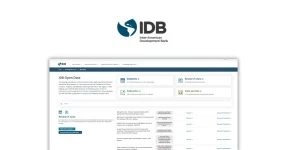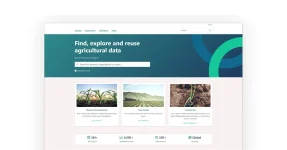Table of contents
In a November 2014 post on this site I posed the question, is CKAN fuelling the growth of open data? This was prompted by an examination of Google Trends for four of the leading open data solutions, as indicated by worldwide search terms. This showed not only a increasing interest in the subject of open data but a greater attention to open source CKAN over other solutions, including Junar and DKAN and proprietary solutions such as Socrata.
Thinking about this post a decade on, I believe my question has been answered in the affirmative. CKAN has and continues to play a substantial role in driving government transparency, accountability, openness, access, and knowledge, through open data initiatives. And in the process of doing this and helping to grow an ongoing demand for quality, easily discoverable open data by governments, citizens, researchers and businesses, CKAN has become more than just a product with a typical life cycle. It has achieved something of a perennial status because it is thought of as social technology that is as much about a mission as it is about a set of technological features.
CKAN and the product life cycle
The first thing that came into my mind when I was thinking about whether CKAN is fuelling the growth of open data for a 2024 audience, was the work of German-born American economist and a professor at Harvard Business School, Theodore Levitt. In an influential 1965 article in the Harvard Business Review, Levitt explored the concept of the product life cycle, from market development, to growth, to maturity, and decline. And he discussed the importance of businesses beginning to plan for the extension of the lives of their products, even before formally launching them.
It occurred to me that rather than having a strict product life, CKAN is now recognised, to use the words of marketer Ryan Holiday, as a ‘perennial seller’. As discussed in his 2017 book of the same name, a perennial seller occurs when a product continually finds new markets and audiences. The reasons behind this are complex but include the product’s market and purpose being at the forefront of thinking from its very inception. Indeed, the two seamlessly reinforce each other.
Holiday’s proposition serves as an accurate description of CKAN. The guiding principle behind CKAN is that open data is a public good that should be non-right restricted and easily transferable, and that creates more value the more it is shared. In this way, in addition to creating public good, CKAN’s success in making quality data more open and discoverable also serves as its most durable and authentic form of marketing.
The centrality of data
What other evidence exists to back up the contention that CKAN is a perennial product which is continuing to help fuel the growth of open data?
It’s now widely accepted that data is the main currency of the 21st century, a fact driven by the increasing digitisation of nearly all key facets of life and the ability of technology to help capture data. But there is also the clear recognition that data needs to be properly organised and made more open and easily discoverable, so that its value can be unlocked, whether this is for greater government transparency, a better informed citizenry, or improved public policy.
CKAN is open-source data management software that can be configured and set up to function as an open data platform once it is deployed and hosted on a web server. Being open source means that the original source code has been made freely available, allowing anyone to redistribute and modify it. The purpose behind its design is to enable data to be published, shared, and discovered. It provides an easy-to-use interface for data publishers and users, that enables governments, organisations, researchers and the general community to upload datasets in various formats, allowing easy discovery and access. CKAN’s programming application interface and wide range of extensions make it highly adaptable to different needs, which in turn encourages its wider adoption.
CKAN’s functionality has seen it become a central component in the development of open data initiatives over the last decade, particularly for governments and those involved in what is referred to as civic tech. According to a 2016 paper by CKAN founder Rufus Pollock, civic tech is ‘digital technology (websites, apps and platforms) related to “civic” life. As defined, it includes most notably all government IT (whether in house or procured) but also includes technology created by others directly for citizens – from apps that let you register to vote to those that let you email your elected representative.’ A core civic tech agenda pursued by governments at all levels across the world has been the establishment of open data portals; front-line interfaces that bridge data providers and users, helping to ensure that data is not just accessible but usable.
Measuring CKAN’s uptake and impact
The most obvious way to measure CKAN’s central role in the increase in open data, is its uptake. CKAN is literally being used by millions of people world-wide each month. Research in 2023 identified nearly 400 regularly updated CKAN data portals of different sizes in 59 countries. This includes some of the most significant open data portals in the world, such as the German Government’s open data portal, the United States Open Data Portal, Open Africa, the largest repository of data on the African continent, and Canada.ca, the official website of the Canadian Government.
And the civic tech space will only continue to expand as governments collect more data, much of which they will have to organise and make open to meet not only the needs and expectations of their citizens. To cite a recent example of both the growing importance of civic tech and open source software such as CKAN’s importance in this, in August the US administration pledged $US11 towards open source security initiatives. This is aimed at gaining a better understanding of how open source software is used across critical government infrastructure, including healthcare, transportation and energy production, and how to better secure it.
But in addition to major players, much of CKAN’s usage is by individuals or small groups with only limited developer experience and resources, who are seeking to make data open. This is because CKAN is what is known as out of the box software, i.e., it can work immediately when placed into service. It can be set up and configured to function as an open or internal data platform once deployed and hosted on a web server. And because it is open source, the cost of accessing a CKAN instance is small compared to commercial software.
How to better assist these smaller users is a key rationale behind the changes currently being made to CKAN – collectively known as CKAN 3.0. These are seeking to modernize the out of the box experience of CKAN. It is also the aim of an initiative known as ‘Civic Data Ecosystems’, carried out through a program known as Pathways to Enable Open-Source Ecosystems (POSE). The second stage of this work, which was recently funded, seeks to strengthen the community around the software, including creating onboarding pathways for new people to contribute, improved documentation and governance, better tracking of CKAN adoption and help to get users up to speed with the latest version of the software.
CKAN: fuelling open data globally
To return to my central contention, CKAN has played a substantial role helping to fuel the growth of open data globally. In doing so it has established its perennial status because it is a technology that combines a social mission with a set of technological features. It is an almost cultural nexus between open source contributors, the public institutions that use it, the advocacy organisations that remain in alignment with it and the virtuous path it is on, sensitive to emergent ideas and concepts.
While millions of dollars have been invested by companies in proprietary open data start-ups, CKAN remains completely free and downloadable for any government, institute, organisation. In this way, CKAN is proximal and always ready for advocacy organisations like Open Knowledge Foundation and the Open Data Charter to use. And it is also central to the creation of affordable digital public goods – digital infrastructure contributes to sustainable national and international digital development – for governments and civil society organisations, many of whom would otherwise lack the means to establish and maintain this on their own.
And it continues to be run and delivered with absolute excellence, and with eternal thanks, by singularly dedicated individuals from all over the globe. CKAN is for the people, built by the people and remains, as ever, a project that will evolve to serve the people. And Link Digital remains honoured to play a continuing role, along with so many people and organisations, in making this happen.
Let’s talk about your open data project
Does your organisation have an open data project it needs help with? Or do you require help to customise your CKAN application by taking advantage of the wide array of extensions available? If so, contact us and tell us about your project.



